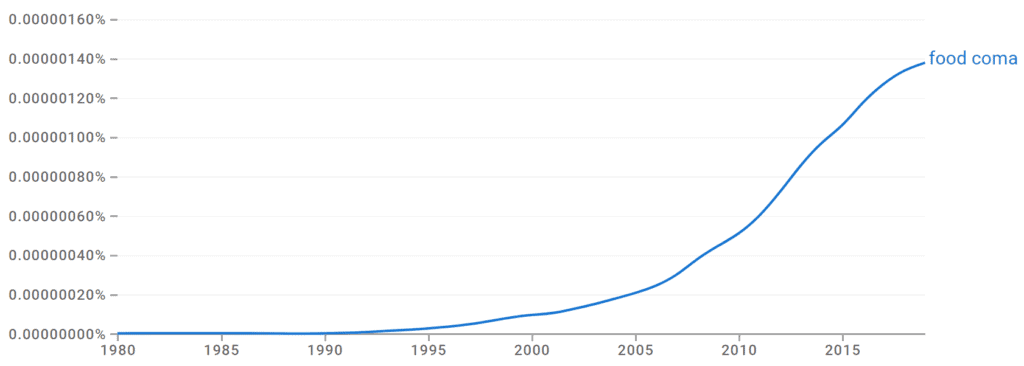People love applying nicknames and slang terms to experiences and events in their lives, but sometimes these phrases can confuse anyone unfamiliar with the language.
The English language has many terms, such as food coma, which have a literal meaning – making them easier to understand. A food coma is exactly as it sounds: sleep due to food.
This term actually has a scientific explanation, and the popularity of its use has exploded into the general English language since the late 1990s. Let’s take a look at what it means and how you can use it in your speech and writing.
What Is the Meaning of Food Coma?

The scientific name for a food coma is postprandial somnolence, which literally means “eating sleepiness.” It refers to the sense of decreased energy levels that lead to fatigue or sleepiness shortly after eating a meal.
This is caused by a few different factors, mainly the types of foods you eat and the possible shifts in the body’s circadian rhythms that help regulate sleep patterns. Certain foods, especially those high in proteins, contain tryptophan, an amino acid that creates serotonin – the hormone responsible for digestion, sleep, and mood shifts.
After eating high protein-rich foods, many people begin to feel sleepy due to tryptophan release into the body. Many foods, such as potatoes, rice, and sugary ingredients that are eaten alongside tryptophan-rich foods, also have a high glycemic index. Foods with a high glycemic index release sugar into the bloodstream quickly, making the body feel sluggish and slow after the initial burst of energy. This combination and resulting sleepiness are often dubbed a “food coma.”
Food coma is often used humorously after indulging in a large meal, but it does refer to a very real scientific effect of food on the body.
For example:
- I never should have eaten a second piece of pie; after that meal, I’m already feeling the effects of a serious food coma.
- I can’t wait until I can dig into all those good meals on the cruise and then sleep off the food coma effects on the upper deck.
- If you don’t slow down, you’ll end up in a food coma and miss out on all of this evening’s shenanigans!
Food Coma Origin

Food coma is a phrase that was added to the Oxford English Dictionary in 2014 but has been around since the 1980s – with an increase in use during the 1990s. Today, it is considered an official term to describe the sleepy effects some people feel after a large meal.
Nobody is 100% certain about where it originated from, but it is often used around the Thanksgiving holiday, as the festivities revolve around an enormous family meal. Its early usage seems to revolve around seasonal food abundance and habits of eating too much and then lying around watching television and socializing afterward (complete with loosened belts and snoring on the couch).
Let’s Review
Although its exact origins are unknown, the term food coma began to be used in the late 1980s, with an explosion of the term through the 1990s and early 2000s. In 2014, it was added to the Oxford English Dictionary and is an accepted term to describe the sleepiness and fatigue felt after a large meal.
Food coma has a scientific explanation tied to the natural chemicals found in certain foods and how it affects the body’s natural digestion and hormonal responses regulating moods and sleep.
